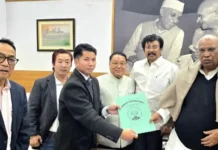GANGTOK, 13 Aug: PepsiCo India, CG Foods, Parle, Coca-Cola India, and ITC were found to be the top five plastic polluters in the Indian Himalayan region in 2024.
The top polluters were identified through ‘The Himalayan Cleanup Campaign’ (THC), which is conducted across mountain states, in which volunteers clean up various sites and audit the waste collected.
The findings were announced by the Zero Waste Himalaya (ZWH) platform and the Integrated Mountain Initiative [IMI] during a webinar on ‘Zero Waste Himalaya Day’ on 8 August, which was followed by a workshop on 12 August in Gangtok, Sikkim.
ZWH and the IMI are the leading organisations conducting THC since 2018, with a waste and brand audit to name the companies that pollute the Himalayas, and call them out to take responsibility for their plastic waste through the extended producer responsibility rule, which is already notified by the government.
This rule, however, finds little to no implementation in the mountains. This year, more than 15,000 volunteers participated in the campaign, cleaning up more than 350 sites, and auditing waste in over 150 sites.
Sikkim and Darjeeling Himalayas had the highest number of cleanups conducted.
The event in Gangtok, organised in collaboration with
the Swachh Bharat Mission (Grameen), saw the presence of Gangtok Municipal Corporation (GMC) deputy mayor, the Darjeeling municipality chairperson, councillors from the GMC, the RDD secretary, the food & civil supplies secretary, the SBM mission directors (urban and rural), State Pollution Control Board officials, education department officials, RDD officials, civil society organisations from Darjeeling and Sikkim, educational institutions, and individuals.
IMI secretary Roshan Rai said that “the existing policies and practices are not sensitive and sufficient to respond to the waste crisis, and there is a need to acknowledge the socio-ecological importance, fragility and challenges of the Himalayas.”
He stressed the need to “shift the solution narrative beyond the broom, bin, landfill, burn and roll it downhill, and move towards systemic solutions.”
The presentation on the findings of THC-2024 by ZWH member Priya Shrestha highlighted that 1,21,739 pieces of waste were picked up by the volunteers, of which 1,06,857 was plastic (87.7%). Only 24.8% of plastic waste collected was recyclable, while the rest were all non-recyclable plastics.
The mountains are struggling with collecting and linking recyclable plastics for processing, and then to top it all, these multilayered plastics add more challenges as they have no solutions and value for collection.
Food packaging has been consistently the highest trashed item at 84.2% of all plastics, which indicated high consumption of junk processed food. Twenty-two per cent of all beverage bottles collected were of the energy drink Sting, which has very high consumption among students, though it is labelled as ‘not recommended for children’.
The food and waste intersect was highlighted as very concerning for mountain communities, as mounting evidence showed junk processed food to be the leading cause of non-communicable diseases.
Along with the top five polluters, Perfetti Van Melle, Hindustan Nestle, Mondelez India, GCMMF (Amul), Tej Ram Dharam Pal, Trimurti Fragrances, Parle Products, Dharampal Satyapal Group, Hindustan Unilever, Haldiram’s Snacks, Surya Nepal, Dabur India, AAECG-Surya Nepal, Britannia Industries, and Ventures are in the top 20 companies polluting the Indian Himalayan region.
Various organisations from Sikkim and Darjeeling,such as the WWF India, the TIEEDI, Friends of Chongay, Little Green World, and DLR Prerna, who conducted the campaign, spoke on their insights and experiences.
Various schools presented their cleanup insights through poster presentations.
The Himalayan Cleanup Campaign-2024 was launched during the Gangtok workshop.
In her address, Gangtok Deputy Mayor Tshering Palden mentioned the challenges faced in waste segregation, and “the lack of people to work in waste due to the stigma attached.” She also mentioned the importance of working on bringing behavioural changes among the citizens.
Darjeeling Municipality Chairperson Dipen Thakuri said that the municipality is “working with a vision for 20 years,” and that “efforts to undo the damagesmade by this generation have to be made very seriously.”
Participating organisations and schools provided key suggestions on moving towards systemic solutions to tackle the issue of high junk food consumption, and on how EPR could be made more effective for the mountains.
The event ended with a unanimous call to the plastic polluting companies to take responsibility for the plastic trash they are dumping in the mountains.



